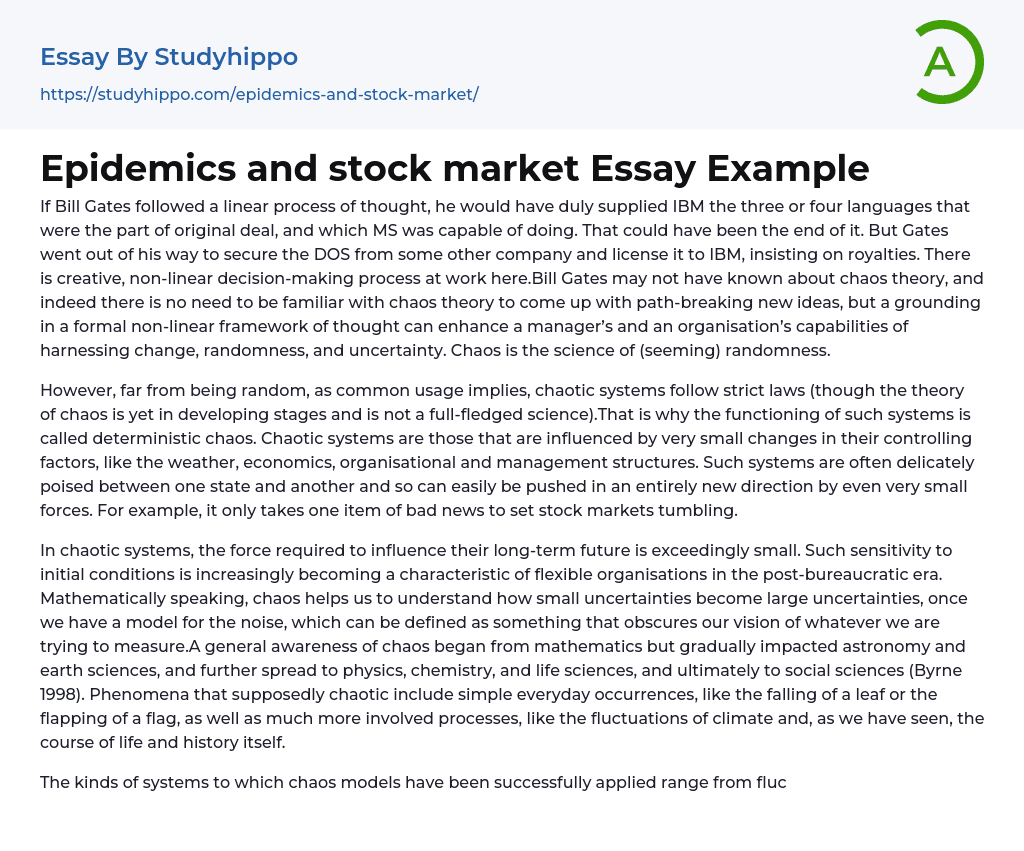Bill Gates could have simply fulfilled the original deal with IBM by providing them with the three or four languages that Microsoft was capable of creating if he followed a linear thought process. However, Gates went beyond that and obtained DOS from another company, licensed it to IBM, and demanded royalties. This demonstrates a non-linear decision-making process that involves creativity. Although he may not have been familiar with chaos theory, having knowledge in a formal non-linear framework of thought could improve a manager and an organization's ability to handle change, randomness, and uncertainty. Chaos theory is the scientific study of apparent randomness.
Despite common usage implying randomness, chaotic systems actually follow strict laws, known as deterministic chaos. This area of study is still developing and not yet a fully-fledged science. Chaotic systems include those influenced
...by small changes in controlling factors, such as weather, economics, organizational and management structures. These systems are delicately poised between states and can easily be pushed in new directions by even small forces. For instance, a single item of bad news can cause stock markets to plummet.
Chaos is a feature of systems where even a small amount of force can significantly affect their long-term future. This sensitivity to initial conditions is also a characteristic of flexible organisations in the post-bureaucratic era. In terms of mathematics, chaos allows us to understand how small uncertainties become large uncertainties once we have a model for the noise. Noise can be defined as something that obscures our vision of whatever we are trying to measure. The awareness of chaos originated in mathematics, then spread to astronomy and earth sciences, and later impacted physics, chemistry, lif
sciences, and social sciences (Byrne 1998). Chaotic phenomena can include everyday occurrences such as the falling of a leaf or the flapping of a flag, as well as more complex processes such as climate fluctuations and the trajectory of history and life itself.
Chaos models have demonstrated efficacy in a diverse range of systems, spanning from fish populations and epidemics to the stock market. Recently, the role of chaos theory has gained significant relevance in social sciences, particularly in economics. Economic systems may exhibit chaos, although this is not universally true. The movement of gold prices or international currencies, for instance, prompted speculation on whether markets were governed by randomness or determinism.
The way in which markets operate can be described as "chaotic", meaning they are neither certain nor random. Although they are deterministic, their patterns of change are intricate and responsive to the environment. Markets can often stay in a state of anticipation until a decisive moment when a small shift in transactions can cause sudden buying or selling behavior.
If movements become too extreme, a fast drop or crash may occur. As organizations become more open and dynamic, they inevitably come under the influence of complexity theory's principles. Due to rapid environmental changes and increasing complexity, non-mechanistic organizations must become more flexible and adaptable. Open systems theory, considered a precursor to complexity theory, views an open system as dynamic with members who exert agency, and changes that are irreversible and self-regulating. Through the organism's interaction with the environment, novel changes emerge spontaneously for an unpredictable future.
Even though chaos theory is commonly associated with complete disorder, the reality is that chaos contains and generates order. Therefore, to
some degree, the changes that occur can be described using this theory. Chaotic systems exhibit a considerable degree of orderliness in their movement patterns, as innovations in this field have demonstrated. As a result, these patterns can occasionally be employed to predict the outcome of such systems. Many systems that appear to operate chaotically have a fundamental truth: there is order amidst chaos.
- Finance essays
- International Business essays
- Macroeconomics essays
- Barriers To Entry essays
- Microeconomics essays
- Pricing essays
- Profit essays
- Consumerism essays
- Export essays
- Free Trade essays
- International Trade essays
- Compensation essays
- Monopoly essays
- Trade essays
- Industry essays
- Warehouse essays
- Economic Development essays
- Economic Growth essays
- Inflation essays
- Taxation essays
- Central Bank essays
- Monetary Policy essays
- Economy essays
- Gross Domestic Product essays
- Recession essays
- Capitalism essays
- Economic System essays
- Materialism essays
- World economy essays
- American Dream essays
- resources essays
- Max Weber essays
- Employment essays
- Minimum Wage essays
- Unemployment essays
- Human Development essays
- Income Inequality essays
- Economic Inequality essays
- Money essays
- Financial Accounting essays
- Market Segmentation essays
- Supply And Demand essays
- Purchasing essays
- Forecasting essays
- Legacy essays
- Bank essays
- Corporate Finance essays
- Financial News essays
- Financial Ratios essays
- Financial Services essays




